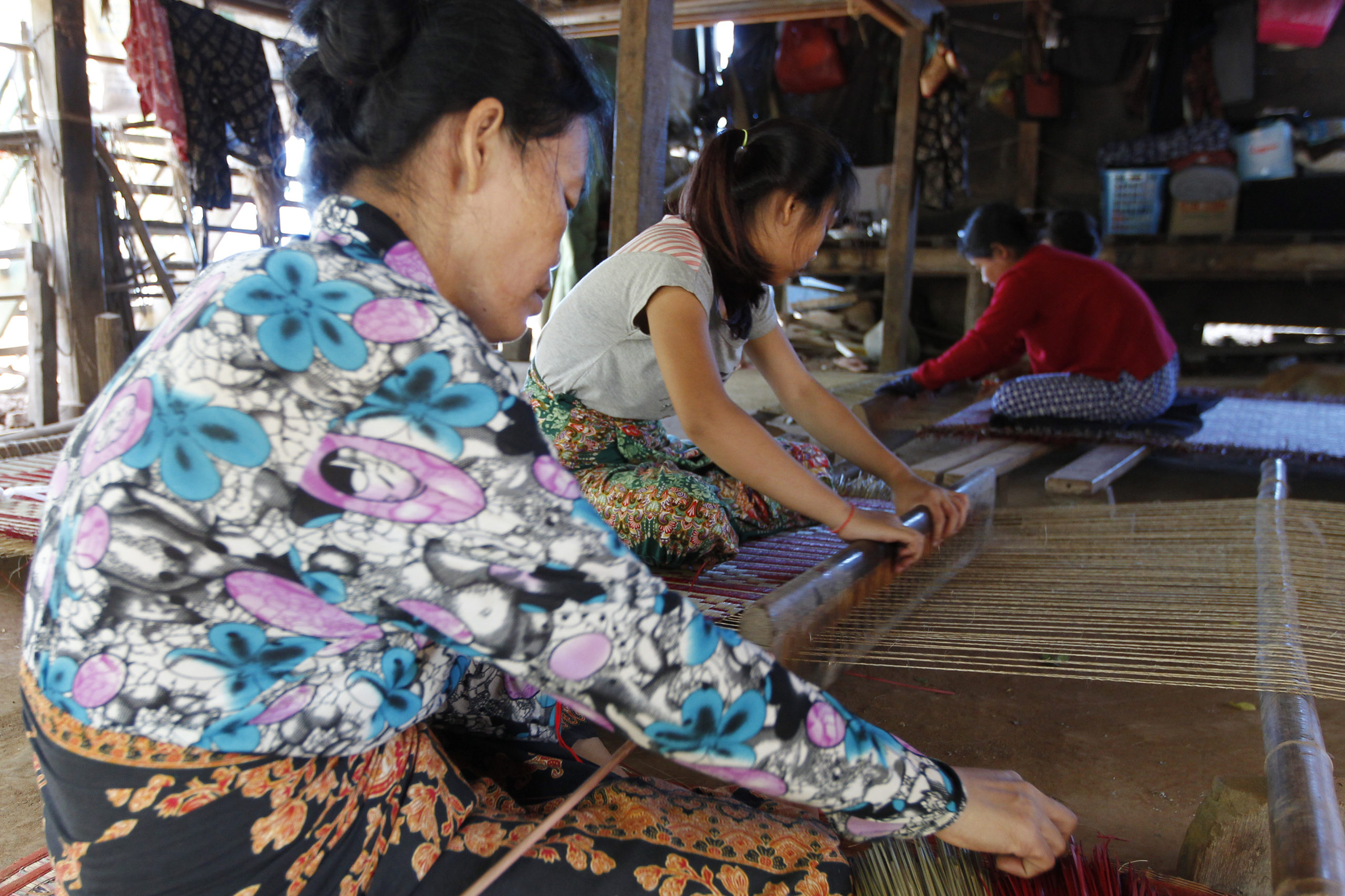In the digital age, prospective donors are told they can save a life with one click of a button.
“Your donation of $500 will get Pisey off the street and into the sewing room with the skills to start her own micro-business,” announced a 2016 fundraising campaign for Sunrise Cambodia, a Cambodia-based charity. It was quickly labelled ‘poverty porn’ in Cambodian and Australian media because of the way in which she was portrayed; a vulnerable, poor girl with dirt on her face, displayed as a victim as a tool for raising funds.
These kinds of promises are common among fundraising campaigns hoping to recruit deep-pocketed donors looking to offer quick-fix solutions to women in need. However, a mere exchange of funds is not enough to adequately support and empower women in the long-term.
March 8 is International Women’s Day, and while millions of women around the world now have the right to vote, own a business and run for office, there is still a tendency to portray women and girls as victims in efforts to raise funds for seemingly one-off donations.
Getting women like Pisey off the street and into a work setting does not adequately acknowledge the complexities of gender inequality within an international development framework, and the work that needs to be done to enhance women’s agency when it comes to their participation in the economy.
The issue is not necessarily the work of charities, many of which do deeply impactful work, but in the narrative surrounding why and how we “help” women to overcome gender barriers.
Often rooted in a deep-seeded history of white saviourism, perpetuating the assumption that women in poorer countries are incapable of helping themselves, charities all across the globe tend to reinforce the vulnerability of women to attract donors. However, this does little to help the women at the centre of the cause.
In Cambodia, there is no shortage of women entrepreneurs. In 2019 a study by the International Finance Corporation found 61% of all enterprises across the country are owned by women.
However, this majority is most evident in micro-sized enterprises, or businesses with less than ten full-time employees, of which women represent 62% of all ownership in Cambodia. That’s much higher than the level seen in Cambodia’s small-to-medium sized enterprises (SMEs), which are defined as having more than 10 full-time paid employees. Considered a core driver of the country’s modern economic growth, only 26% of these businesses are owned by women.
These statistics are highly representative of Southeast Asia, where women are largely fixed in the informal and micro-economies, often distancing them from the opportunities available to bigger and more established frameworks, such as SMEs, where their male peers dominate.

With the economic fallout from Covid-19, and the both direct (in terms of revenue loss) and indirect effects lockdown measures have had on women-run businesses – such as increased risk of gender-based violence and likelihood of lost income – re-thinking the structures within the patriarchal system that continue to perpetuate this inequality has been moved to the forefront of advocacy efforts.
Honing in on women and gendered solutions to increase empowerment opportunities has become especially important amidst the pandemic. According to CARE Cambodia, with less access to business associations and networks, Cambodian women in the private sphere are more likely to lose paid employment or be relegated to lower-skilled work.
Channy lives in rural Battambang province in western Cambodia. She saw an opportunity through the SHE Incubator Program to start her own business selling banana chips. The programme consists of 13 days of business training workshops, delivered in Khmer language by Khmer female trainers, and is open to any woman running a micro-small sized business in Cambodia.
However, to apply for the programme, Channy needed to make an investment in herself. She travelled seven hours by bus to Phnom Penh each month to study at her own expense, and made a financial deposit to secure her place in the programme, which was returned to her upon graduation.
Following the training, Channy made a decision to re-invest some of her revenue back into her business, in order to expand and pay forward her experience to create more opportunities for other women.
“I built a new workshop, and increased production capacity by hiring several people to help me,” Channy said. “When my business is bigger, I can create more jobs for people in my village. Farmers in my village are happy when I keep buying bananas. Some women are happy too because they can work with me.”
Before, I felt like I couldn’t do much. Like they say, women belong to the kitchen. I now realise that I’m not only a housewife. I can go outside, manage my business, and access training to improve my skills
More than 320 Cambodian women have graduated from the SHE incubator and accelerator programmes since 2015. Together, these women have created over 500 new jobs, and report an increase from previous monthly earnings of more than $723,000 in combined monthly revenue.
That is millions of dollars in new revenue being contributed towards Cambodia’s economic growth each year – all from women-led, micro-sized, and mostly informal enterprises.
While Cambodian women excel in the informal and micro sectors, they often hit barriers when trying to expand their businesses or enter the formal economy. The reasons for exclusion are plentiful, however prevailing social norms, many of which are rooted in traditional gender roles, remain a central cause of this imbalance.
Although Cambodian law does not directly discriminate against women, social norms, such as the Chbab Srey, a classical Khmer poem that translates to “Rules for Women/Girls” and was formerly taught in public schools, are often interpreted as teaching women and girls to be submissive to their male counterparts. The result of this is a diminished sense of self-assurance and confidence.
Nitin Madan is a consultant to the UN Economic and Social Commission for Asia and the Pacific (UNESCAP) and a resident advisor to Women’s World Banking. From his experience, Madan believes efforts to support women must take into account the gendered circumstances they face.
“We talk about financial products more suited for women, but we don’t have conversations around the cultural context that women are operating within. Considering this context would help us to design better solutions for women entrepreneurs,” Madan said.
“Accessing digital tools and products at any time of the day, for example, enables women to balance gendered domestic expectations and responsibilities.”
Another graduate from the SHE Incubator programme, Sreypov, had similarly faced social pressures before founding her own local honey business and coffee shop, which today has grown to be an SME. Before speaking with other women, she never even imagined she could own her own company.
“Before, I felt like I couldn’t do much. Like they say, women belong to the kitchen,” Sreypov said. “I now realise that I’m not only a housewife. I can go outside, manage my business, and access training to improve my skills and grow my business further.”

The pandemic has also triggered greater visibility of the digital gender divide, the gap between the degree to which men and women are accessing digital tools, services and platforms, particularly for business.
A lack of digital skills disproportionately prevents women from entering and excelling in the business sector. With businesses forced to move their services online amidst widespread lockdown measures, those lacking the necessary skills and resources have struggled to keep their companies afloat.
In May 2020, SHE Investments partnered with Youth Business International and Google.org to conduct a rapid assessment of the impact the pandemic was having on women’s businesses.
Among the 75 businesses surveyed as part of the programme, 96% said they had “poor” or “very poor” digital skills, which had contributed to a collective loss of over 50% of revenue since the onset of the pandemic in March 2020.
Given this overwhelming deficit, business support services are working to include specific access to digital capacity building to enable them to adapt to a new kind of business environment, one that is increasingly reliant on the use of the internet and digital tools for survival.
I saved my business. I did not have to let go of my employees. I was able to save all of their jobs
Sabine Joukes, country director for Pact Cambodia and chief of party for We Act, a USAID-funded project focused on supporting young women entrepreneurs in Cambodia, says investing in women is not only the role of donors. Instead, it must be a collective effort by private and public sectors through investments that are sustainable, rather than charitable.
“We are all in agreement that women entrepreneurs are important, but it is not just about investing in an individual,” Youkes said. “We need to take a systems approach with stakeholders, including government, to make the entire system work better.”
To equally participate in the private sector, not only in the short-term but in a meaningful and sustainable way, women require access to gender and culturally relevant information, business training and registration services. They also need gender-sensitive mentors, equal access to relevant financial capital, and the presence of female role models within the business sector. Investment into digital skills training is also crucial so women will not be left behind in a post-Covid world.
Examples of this work include initiatives to launch e-commerce marketplaces, private sector companies such as Facebook training Cambodian facilitators to deliver social media training for women entrepreneurs, and business incubators partnering with sponsors such Google.org to deliver Covid-19 responsive digital literacy training for women entrepreneurs.
These initiatives, along with the SHE Incubator programme, are some of the efforts in place to shift the focus away from one-stop charities to opportunities with long-term impacts.
For Sreypov, the focus on sustainability has already started to pay off. Since graduating from an incubator programme in 2019, she has more than doubled her business revenue and created employment opportunities for an additional 18 people. Last year, she participated in a digital literacy training programme and transitioned her business to sell products online.
“I saved my business. I did not have to let go of my employees. I was able to save all of their jobs,” Sreypov said.
Celia Boyd is the Managing Director and co-founder of SHE Investments, Cambodia’s first gender-focused and culturally tailored business incubator and accelerator for women entrepreneurs.


